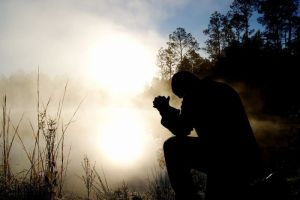Resetting the date of America's birth

The New York Times proposed recently that we revise America’s historical narrative by resetting our national birth date.
Beto O’Rourke, among others, is championing the cause.
The Times argued that the “true founding” of the United States should be pegged to August 20, 1619, when the first slaves from Africa were brought to the Jamestown Colony in Virginia. The writers believe that “nearly everything that has made America exceptional grew out of slavery.”
The Times, since 1913 at least, has been widely regarded as our nation’s “newspaper of record.” If the Times believes our national birthdate is changeable, it must be so.
I didn’t know our birthday was up for grabs. However, since, by the declaration of the newspaper of record the date is fungible, I would like to propose another instead: July 2, 1630.
On that date, John Winthrop, bobbing in the Atlantic halfway between the Old World and the New aboard the ship Arabella, readied himself to assume the governance of the Massachusetts Bay Colony. In a sermon given while on the ship, Governor Winthrop cast vision for the settlement that would go to the roots of the nation that would eventually arise.
Some would even say that Winthrop infused the very “DNA” that would ultimately shape America’s highest and best identity.
Winthrop reminded his shipmates and fellow colonists that, as in the case of Old Testament Israel, they were in covenant with God. Russell Kirk, in his important book, The Roots of American Order, recalled that the Israelites broke the Ten Commandments almost as quickly as they were revealed to them. So, said Kirk, “the principles of order reaffirmed by Winthrop “were violated by the settlers in New England not long after their landing in Massachusetts.”
But the “DNA” was in their hearts and souls—and so was God’s grace. The settlers had to learn again the positive truth of repentance: it is a “turning,” a going back to recover principles that were lost. And it was to the vision articulated through Winthrop, and the values revealed by God to which they would return. They often felt God’s hand of judgment but learned to see it as the positive impetus to turn away from darkness and to the light they were to reflect to the whole world.
Winthrop articulated values that would be foundational in the worldview expressed in the Preamble to the Declaration of Independence, and in the Constitution that would provide the details of implementation.
It is noteworthy that the spiritual soil of New England was not fertile for slavery. There were individual slave owners here and there in the early days, but the institution of chattel slavery could not take root.
In fact, as early as 1688, the abolition movement was stirring in New England, through Quaker Christians.
In his 1630 speech, Winthrop told his companions that they as well as he as their leader must always have “before our eyes our commission and community in the work” and “keep the unity of the spirit in the bond of peace… the Lord will be our God and delight to dwell among us… For We must consider that we shall be as a City upon a Hill; the eyes of all people are upon us.”
Governor Winthrop took those last words directly from a saying of Jesus, recorded in Matthew 5, the Sermon on the Mount. The context is the lifestyle of the Kingdom of God, and those who live by its precepts. Such people, said Jesus, would be “the salt of the earth” and “the light of the world.”
When He spoke, the Lord was standing on a slope by the Lake of Galilee. Perhaps Jesus pointed toward the village of Safed, perched on a mount within view of His listeners. Its position was high enough that its light gave direction to night-travelers.
“A city set on a hill cannot be hidden,” said Jesus.
Paul Johnson, in his classic book, A History of the American People, discussed what the words meant to John Winthrop when he spoke them on the Arabella. The New England colony Winthrop would lead “would create an ideal spiritual and secular community” that others across the world—and especially across the Atlantic in the “Old World”—could see as an example of a good society.
Considering that people crowd today on America’s borders trying to get in while many other nations struggle more with emigration than immigration, the lights of the “city on a hill” must still be burning brightly, despite those who say America is a dark land.
Actually, I don’t favor changing America’s birthday. All that went before was gestation—including the “DNA” infused by John Winthrop’s sermon, and the ugly virus of slavery, that, had it lasted, would have reduced the “City on a Hill” to ruins in a ditch.
The virus could not survive in the light of the truth spoken by Winthrop and received by the New Englanders, or the force of the Declaration of Independence’s words recognizing that all humans “are created equal,” and “are endowed by their Creator with certain unalienable Rights—that among these are Life, Liberty, and the pursuit of Happiness.”
If we recommit to making America a “City on a Hill” we won’t have to worry about making it “great again.”
Let’s keep July 4, 1776 as the birthday, celebrate July 2, 1630, as conception day, and observe August 20, 1619 as a day of national repentance.
Wallace Henley, a former White House and congressional aide, and pastor, works with congregations and their leaders in helping develop and grow transformational churches. His latest book is Call Down Lightning, an analysis of the Welsh Revival of 1904-5, and its implications for our times.




























